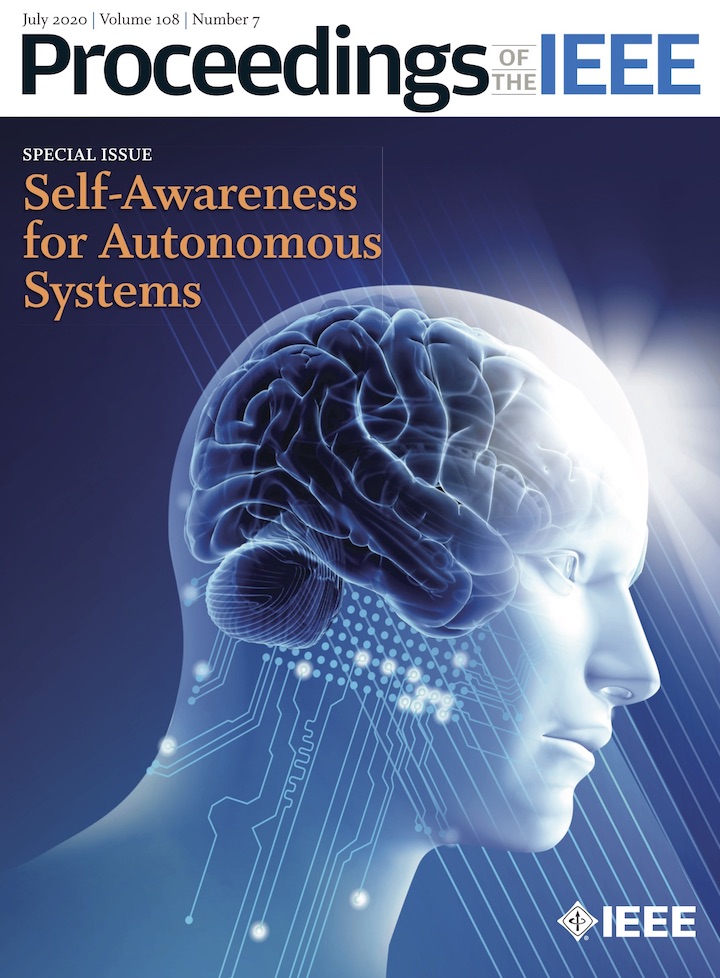2020 Journal Issues July 1, 2020


Special Issue: Self-Awareness for Autonomous Systems
Volume 108, Issue 7
July 2020
Guest Editors
Guest Editors: Nikil Dutt, Carlo S. Regazzoni, Bernhard Rinner, and Xin Yao
Special Issue Papers
By Nikil Dutt, Carlo S. Regazzoni, Bernhard Rinner, and Xin Yao
By Andrea A. Chiba and Jeffrey L. Krichmar
This article outlines the neurobiological principles for living organisms that inspire self-awareness in engineered systems, using adaptive, self-monitoring robots as an exemplar for an engineered self-aware system.
By Carlo S. Regazzoni, Lucio Marcenaro, Damian Campo, and Bernhard Rinner
This article provides a Bayesian multisensor signal processing framework allowing an autonomous system to perform self-supervised estimation of self-awareness models by using proprioceptive and exteroceptive dynamic descriptions of its own experiences.
By Louise A. Dennis and Michael Fisher
This article provides an overview not only of how one can construct self-aware autonomous systems, but also of how one can potentially have verifiable, self-aware behavior.
By Henry Hoffmann, Axel Jantsch, and Nikil D. Dutt
This article addresses self-awareness in the context of computing platforms embodied in a physical environment, using illustrative case studies in health-monitoring, systems-on-chip, control systems, and industrial production systems.
By Zidong Du, Qi Guo, Yongwei Zhao, Tian Zhi, Yunji Chen, and Zhiwei Xu
This article reviews advances in self-aware neural networks and presents a case study of a neural network system that deploys self-awareness to adapt to varying demands in performance and energy.
By André Bauer, Marwin Züfle, Nikolas Herbst, Albin Zehe, Andreas Hotho, and Samuel Kounev
This article overviews methods for time series forecasting as an important pillar for decision making in self-aware systems. It further discusses feature engineering techniques and assesses a data-center resource management case study
By Tao Chen, Rami Bahsoon, and Xin Yao
This article presents a foundation, a principled methodology, and case studies for synergizing human expertise with architectural design patterns for engineering self-aware and self-adaptive software systems.
By Alexander Schmidt, Heinrich W. Löllmann, and Walter Kellermann
This article provides an overview of acoustic self-awareness signal processing techniques. The role of ego-noise representation and processing in autonomous systems is highlighted, and application case studies are presented.
By Erol Gelenbe, Joanna Domanska, Piotr Fröhlich, Mateusz P. Nowak, and Sławomir Nowak
In this article, self-awareness in networking is discussed. Examples of advantages of self-aware networks with respect to quality of service, energy, and security are presented.
By Siwei Zhang, Robert Pöhlmann, Thomas Wiedemann, Armin Dammann, Henk Wymeersch, and Peter Adam Hoeher
This article presents methods for incorporating self-awareness into a swarm navigation system through a case study.
By Sanjoy Baruah, Peter Lee, Prakash Sarathy, and Marilyn Wolf
This article provides an industrial perspective on self-aware autonomous navigation systems, with a focus on critical features required to achieve resilience and behavioral assurance for mission-critical applications spanning air, ground, marine, underwater, and space systems.
3 Comments
Comments are closed.